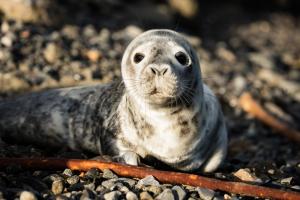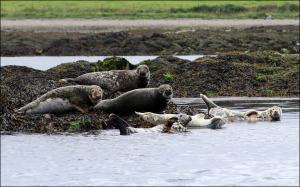Seals may be seen lying on beaches or rocks (‘hauled out’) to rest, warm up and breed; they are very sensitive to disturbance, especially during the pupping season. As with any large, wild animal, they may also inflict a powerful bite if they or their young feel threatened. Interference by humans may also lead to mothers abandoning their pups, or for vulnerable grey seal pups, who do not enter the sea until 3-4 weeks old after moulting their white baby coat, drowning or succumbing to hypothermia in an attempt to escape potential threats.
Both species of seal are fully protected by law from killing and intentional or reckless disturbance.
What to do if you think a seal is injured or distressed
- Contact Exploris on 07701 372 623
 Harbour seal pup
Harbour seal pup - Do not pick the seal up or chase it back into the sea. Instead, observe from a safe distance until the rescue team arrives.
 Grey seals hauled out on rocks
Grey seals hauled out on rocks - If possible look for any signs of injury to provide an accurate description of these along with size and species and location (including description of shoreline).
- Keep other people and dogs away as this may result in increased stress or injury to the seal.
- Seals can inflict bites as well as carry infections or diseases which can be transferred so avoid close contact.
Response to Dead Stranded Animals located on Northern Ireland shores
If you come across a dead marine animal (whale, dolphin, porpoise, seal, shark or marine turtle) located on Northern Ireland shores contact the DAERA Marine Wildlife Team so we can record this for scientific purposes. Please provide information on location, species, size, condition and any photographs if possible. Removal of the carcass is at the discretion of the landowner or land manager.
